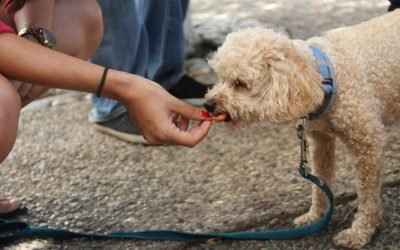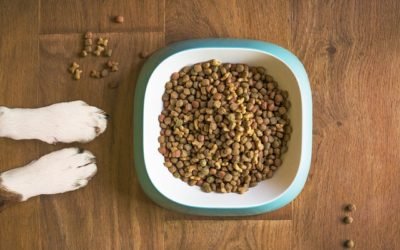Is It Bad to Feed Dogs Human Food?
Dogs are our loyal and loving companions, and it’s only natural that we want to share our food with them. But many human foods are unsafe for our furry friends.
In fact, some foods can be extremely toxic and even life-threatening to dogs. In this blog post, we will explore 10 common human foods that can be harmful to dogs and why it’s important to keep them out of reach.
Whether you’re a new dog owner or a seasoned pro, this information is essential for keeping your dog healthy and safe. So, grab a notepad and get ready to learn about the foods you should never share with your four-legged friend.

#1: Onions
Why are onions bad for dogs?
Onions are toxic to dogs and can cause serious health problems. Onions contain a substance called N-propyl disulfide which can damage a dog’s red blood cells, leading to anemia.
Symptoms of onion toxicity in dogs can include vomiting, diarrhea, weakness, breathlessness, and increased thirst and urination. In severe cases, onion toxicity can lead to damage to the dog’s liver and other organs, and can even be fatal if left untreated.
Keep even small amounts of onions and foods that contain onions out of reach of dogs, as even just a little can cause serious harm.
#2: Raw Potatoes
Are raw potatoes bad for dogs?
This might be surprising, but raw potatoes are bad for dogs. They contain solanine, a toxin that can cause gastrointestinal upset, vomiting, diarrhea, and in severe cases, even neurological symptoms such as tremors, seizures, and difficulty walking.
Additionally, the green parts of the potato plant, as well as the sprouts, contain even higher levels of solanine and should be kept away from dogs.
Cooked potatoes are generally safe for dogs, but it is best to avoid feeding them to your dog as they have little nutritional value and can lead to weight gain.
#3: Garlic
Is garlic harmful to dogs?
It might be our favorite flavoring, but garlic contains compounds that can cause anemia in dogs. Symptoms of garlic toxicity in dogs can include vomiting, diarrhea, breathlessness, weakness, and increased heart rate.
In severe cases, garlic toxicity can lead to organ damage and can be life-threatening. It is important to keep garlic and foods that contain garlic away from dogs, as even small amounts can cause harm.
It is also important to note that some dietary supplements and flea treatments contain garlic and should be used with caution in dogs.
#4: Raw Egg
Is raw egg bad for dogs?
Raw eggs contain a protein called avidin which can interfere with the absorption of biotin, a B vitamin that is important for healthy skin and coat.
Raw eggs can also contain Salmonella and E. coli bacteria, which can cause food poisoning in dogs and lead to symptoms such as vomiting, diarrhea, and fever.
In the United States, egg shells are often washed before they are sold, which removes the protective cuticle that naturally coats the shell. This process can increase the risk of contamination with bacteria such as Salmonella.
While cooked eggs are generally safe for dogs, it is best to avoid feeding them raw eggs to reduce the risk of food poisoning and biotin deficiency.

#5: Animal Bones
Is chicken bone bad for dogs?
While bones may seem like a natural and tasty treat for dogs, they can actually be quite dangerous.
Chicken bones, in particular, are brittle and can splinter easily, which can cause blockages or tears in a dog’s digestive tract. This can lead to serious health problems, such as perforations in the intestines, obstructions, and even choking.
In addition, bones can also cause tooth fractures and breakage, which can be painful and lead to further dental problems.
It’s best to avoid giving bones to dogs, and instead, opt for approved chew toys or bones made specifically for dogs.
If you suspect your dog has swallowed a bone, it’s important to seek veterinary care immediately. Remember, while bones may seem like a simple and harmless treat, they can have serious consequences for dogs.
#6: Mushrooms
Is mushroom bad for dogs?
Mushrooms can be extremely toxic to dogs and can cause serious health problems if consumed.
Certain species of mushrooms contain potent toxins that can affect a dog’s organs, leading to symptoms such as vomiting, diarrhea, abdominal pain, seizures, and in severe cases, even death.
The symptoms of mushroom toxicity can occur within a few hours of consumption and can progress quickly, so it is important to seek care immediately if you suspect your dog has ingested mushrooms.
It’s important to note that not all mushrooms are toxic to dogs, but it can be difficult to determine which ones are safe. It’s best to keep all mushrooms and any products that contain mushrooms, such as mushroom soup or pasta dishes, away from dogs.
If you take your dog for walks in areas where mushrooms grow, be sure to keep them on a leash and supervise them closely to prevent accidental consumption.
#7: Chocolate
Is chocolate actually bad for dogs?
Chocolate is one of the most well-known toxins for dogs and can be extremely dangerous, especially for small dogs.
Chocolate contains a stimulant called theobromine, which can cause symptoms such as diarrhea, vomiting, increased heart rate, tremors, seizures, and in severe cases, even death.
The darker the chocolate, the higher the theobromine content and the more toxic it can be for dogs.
#8: Grapes
Are Grapes and Raisins bad for dogs?
Grapes and raisins can cause kidney failure in dogs, even in small amounts.
The exact toxin responsible for this reaction is unknown, but it is believed that any amount of grapes or raisins can be toxic to some dogs. Symptoms of grape and raisin toxicity can include vomiting, diarrhea, decreased appetite, and abdominal pain.
#9: Avocados
Are Avocados Bad for Dogs?
Avocados contain a toxic substance called persin, which can cause vomiting and diarrhea in dogs.
They can also be a choking hazard due to their large pit. Ingestion of avocado leaves, fruit, seeds, and bark can cause vomiting and diarrhea in dogs.

#10: Macadamia Nuts
Are Macadamia Nuts Bad for Dogs?
Macadamia nuts can cause a toxic reaction in dogs, leading to symptoms such as vomiting, increased body temperature, weakness, tremors, and difficulty walking.
The exact toxin responsible for this reaction is unknown, but ingestion of even small amounts of macadamia nuts can be toxic to dogs.
These symptoms can occur within 12 hours of ingestion and can last for up to 48 hours.
What Human Food Is Bad for Dogs
As a responsible dog owner, it’s important to be aware of the human foods that can be toxic to dogs.
By avoiding these foods and keeping them out of reach, you can help ensure your furry friend stays safe and healthy. It’s also a good idea to educate yourself about other potentially toxic foods and substances, as well as to have the contact information for your veterinarian and a nearby animal hospital readily available in case of an emergency.
Although not human food, it is also never good to feed cat food to your dog. See my post on Is Cat Food Harmful to Dogs?
Remember, a little knowledge and caution can go a long way in keeping your dog happy and healthy. See my post on What Human Food Can Puppies Eat for 10 great people foods that are good for dogs of all ages.
Also please consider being a dog foster parent. See my article on How to Be a Foster Parent for Dogs for details.
As always, it is important to give your dog proper nutrition as part of an important part of a dog’s health along with feeding the recommended amount. Also check out my article on Are Grain Free Diets Bad for Dogs?
Thank you for visiting Small Dog Living and leave us a comment if you can.








0 Comments